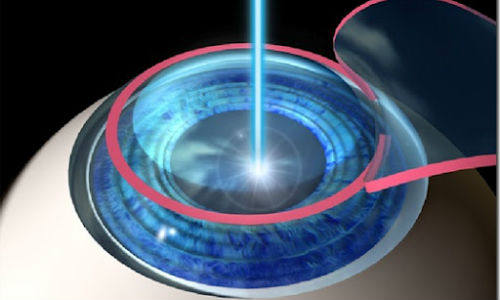Hi! Hopefully I’ve caught you before you went under the laser.
Table of Contents
If You Have Already Had LASIK
If you’re experiencing problems after LASIK, it’s ok; you haven’t ruined your life. Read here about applying these methods after LASIK.
Jump to:
- Let Me Tell You a Story
- The Complications
- It’s Human Tissue!
- You Can’t Solve Your Problems Unless You Can Admit the Source of Them
Let Me Tell You a Story
When I was around 18, LASIK was just coming out as the brand new miracle cure for nearsightedness.
I hated glasses. Contacts weren’t great either, but I was getting them anyway because at least they looked better. My eye doctor showed me a brochure in case I would be interested in a few years.
The diagram had a laser. Lasers were futuristic! I imagined it like some kind of healing laser fixing the inside of the eye, clearing out all the rubble or whatever, because lasers were magic and that’s just what they did.
That makes no sense, of course. Nearsightedness doesn’t come from rubble inside the eye. But honestly I think that’s about the extent of the research that people do before getting LASIK. A brochure, an evaluation by the eye doctor, followed by, “Good news! You are an excellent candidate for LASIK! How is next week?”
As for myself, luckily my eye doctor recommended I wait until I was 23 or so before considering it, because, he said, my vision would stabilize by that age.
By 2000 I was already interested in natural vision improvement and had become doubtful about whether LASIK was right for me. I couldn’t tell you exactly why, but at the time I felt a lot better about improving my vision by natural means, under my own power, the right way. I didn’t feel like LASIK was a good thing.
Maybe it was my mom’s words still echoing in my head. When I was a teenager, my my foot had been hurting for a few months. I got fed up and said in frustration that I need to get surgery for it.
She said, “No David, surgery is not a solution. Tearing it apart will just make it hurt more.”
My minor foot injury healed, the same as all the other little injuries I developed before and in the many years since.
A lady named Sally Keller had LASIK in 1999 and started lasikdisaster.com in 2000. Now it redirects to lasikcomplications.com, but back then it was the frustrated story of a lady who was suffering horrifically from the procedure. If I wasn’t already convinced by then that it was a bad bet, she convinced me right away. She was going blind, and it felt like she was days away from killing herself to escape the blindness and constant pain caused by that huge mistake.
The Complications
Sit back and watch.
As Sally, the founder of lasikdisaster.com found, the surgery comes with long-term complications…
- Bad Night Vision
- Dry Eyes
- Eye Pain
- Infection
- Flap Dislocation
- More – See lasikcomplications.com
Dry eyes and bad night vision (starbursts and halos from light sources) are extremely common. The flap apparently never fully heals and is always in danger of getting knocked out of place if you merely rub your eyes.
Ever want to take off your glasses? Do your eyes feel better when you read a book without your glasses on? You won’t be able to do that after LASIK. Your glasses prescription will be permanently etched in your cornea. There’s no getting away from it unless you start wearing reading glasses (for farsightedness) to relieve some of the tension.
Your glasses for myopia are designed to correct your distance vision only. Your near vision doesn’t require as much correction to give you crystal-clear vision, or none at all if you’re only mildly nearsighted.
Don’t fall for the bogus 96% success rate that the clinics and laser manufacturers advertise.
Remember that surgeons consider the procedure a “success” if you can read 20/20 on the chart. Nevermind the complications!
In other words, your problems don’t count when they compile the numbers, because your problems are a nuisance. This is what happens when an industry gains power; the research is paid for by the industry leaders, and most of the material you can find will lend support to how safe and effective LASIK is.
Luckily, the internet has given individuals like us the potential for tremendous power to counter the misinformation.
I totally understand that you’re enticed by LASIK. It sounds like a miracle cure. A couple zaps and now you’re one of the clear-sighted people!
Before you get it done, isn’t it worth spending just a few minutes doing some research to avoid a potentially life-changing mistake? Take a look at these websites and forums showing you what might happen.
http://visionsurgeryrehab.evecommunity.com/eve/forums
https://www.realself.com/lasik/forum
http://lasikcomplications.com/
http://www.visionsofjoy.org/lasersurgery.htm
It’s Human Tissue!
Your eyes are one of the most sensitive parts of your exposed body.
It’s convenient to think of your eyes as cameras that just need to be re-adjusted by another machine. How ever much you try to paint it that way, the machine isn’t reshaping a camera lens. It’s dynamic tissue that the machines are cutting and burning away. Your eyes were not made to cope with that kind of damage. Heck, your finger wouldn’t respond well to that kind of reshaping, much less something as fragile and sensitive as your eyes.
You Can’t Solve Your Problems Unless You Can Admit the Source of Them
LASIK is no substitute for normal vision, any more than glasses are.
How is that?
Myopia is caused by misuse of your eyes. Myopia is only one symptom.
A few other signs of misused eyes are eyestrain, tired eyes, dry eyes, and light sensitivity. Sometimes these issues can be brought on by other conditions like diseases or food sensitivities, but the fact is that these problems are more common in people with myopia than in people with normal vision. Why do you suppose that is?
Thankfully, we have an alternative to LASIK. Glasses and contacts aren’t a solution either (I know – I went through them).
When people improve their vision naturally, they remark at the improvement not only in how their eyes feel, but in the improved mental clarity, mental quickness, and more relaxed face and shoulders. Myopia goes hand in hand with this overall pattern of tension. Relieving the tension is one part of reversing myopia. The visual system becomes more efficient as you learn to make the subtle adjustments, and you become more mentally and physically relaxed when you use your vision in the way that it was designed to be used.
LASIK doesn’t reverse the misuse and tension. It doesn’t improve your visual functioning.
Look into the eyes of people who have had LASIK. Their eyes look different. Even while some of them say that they are happy with the results, their eyes give the impression of a certain pain and regret. Acknowledging the problems they experience after the operation would be too painful. Perhaps they are the extremely fortunate ones and honestly don’t experience many issues. Still, I believe that everyone understands, at a deep, perhaps unconscious level, that myopia is related to their mental anxieties and the subtleties in how they use their eyes. When LASIK does not cure those problems, as it can’t, they feel a sense of disappointment, even if on the surface they don’t know why.
Be one of the smart ones! Change your life not by burning away your eyes, but by admitting your vision problems are not just about your eyes.
Did this article have any impact on your decision? If it did, make my day by letting me know in the comments below!
get help on our Facebook Group!
I founded iblindness.org in 2002 as I began reading books on the Bates Method and became interested in vision improvement. I believe that everyone who is motivated can identify the roots of their vision problems and apply behavioral changes to solve them.

